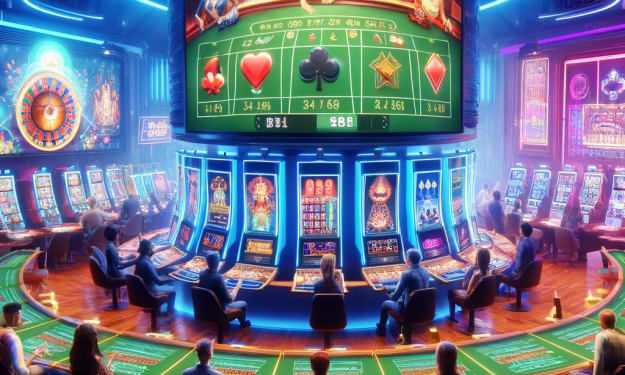DID "POLITICAL CORRECTNESS" TANK MILES MORALES?
Or was it something else?
At this point in my life, I’m not much of a gamer. My friend got me this PC controller, but my computer can’t handle games and I just can’t convince myself to spend money on a console and games, but I love video games, especially those with open world formats. In late 2020, we got Spider-Man: Miles Morales, with Nadji Jeter in the titular role (SN: I love Nadji Jeter. I remember him from Reed Between the Lines, I’ve always thought he was talented). Though I haven’t played it myself, I have watched gameplay for it at least six times because I feel personally connected to the game, the world and the characters. The game is beautiful, the voice acting is really well-done and the soundtrack is really good. I think it's a great game, but its desire to show diversity in its characters and experiences was overshadowed by its limited ability to display reality. On the flip side of things, the game’s desire to be diverse and “politically correct” left a sour taste in the mouth of some gamers and may have affected its sales. So, let’s cover what is perceived as the “political correctness” of the game, the shortcomings of said “political correctness” and how that may have impacted sales.
BACKGROUND
Let’s start with some background about Miles as he exists in the video games, not Into the Spider-Verse or the comics. Miles is an Afro-Latino teenager and a resident of New York City. In the Spider-Man video game, he lives in Manhattan. We meet him right after his father, a police officer named Jefferson Davis, is killed by the Inner Demons. Right away we learn that he’s incredibly intelligent, typical of a Marvel superhero, and that he’s having some trouble dealing with the grief caused by his father’s death. As an alternative to therapy, his mother, Rio Morales, has him volunteer at F.E.A.S.T., a shelter with several locations in New York. While volunteering, he becomes friends with Peter Parker, but doesn’t know he’s Spider-Man. At the end of this game, Miles is bit by a spider that was genetically altered by Oscorp and gets his powers.
In Spider-Man: Miles Morales, Miles is home from Brooklyn Visions Academy for the holidays and learns that Peter will be going out of town, so he has to defend New York alone. Miles and Rio have moved into his abuelas old Harlem apartment. Throughout the game, Miles has two main enemies: Simon Krieger and Roxxon and the Tinkerer and the Underground. In an effort not to spoil the entire game, I’ll end the synopsis here.
Miles is such a good character and I mean that as a double entendre. We can tell that he feels inadequate when compared to Peter. We can tell how much love he has for Ganke, Rio, Phin and his uncle, Aaron. We can tell how much he loves Harlem. We can tell how passionate he is about being a good person. We can tell that he feels inadequate at first when compared to Peter, but by the end of the game, they’re equals.
DIVERSITY AKA “POLITICAL CORRECTNESS”
We see the game’s attempt at diversity and inclusion as well. Ganke and Danika are Asian, or at least of Asian descent, Gloria and Steff are girlfriends, there are several Latino characters like Camila, Teo and Gloria herself, Hailey is deaf and signs as her primary form of communication; she is played by actress Natasha Ofili, who signs as well. In fact, it is the diversity of Harlem that makes it a target for Simon Kreiger and Roxxon. Miles is such a fitting Spider-Man, because he first so well into such a diverse community. He takes on the problems of the city as if they are his own. As someone who has been learning PSE and Spanish solo for a few years, it was really great to see both of those languages being used.
While all of these things are great, there are some shortcomings that I think we should discuss.
The diversity in the game still has some work to do. I would have loved to see Ganke’s character expanded a bit more. We know from the first game that Miles has a good handle on coding hacking apps himself, which leads me to believe that he could have coded the Friendly Neighborhood App on his own and therefore makes me wonder what Ganke was there for. I also would have liked to see Hailey more in the main story, since it seems like she is included for diversity points. She and Miles have a lot of chemistry and it would have been cool to see them interact more or to see a bit of the deaf culture in Harlem. Also, as much as I love hearing Miles speak Spanish, I think Jeter could have worked on his accent a bit more. It’s kind of weird that he took ASL for a bit in school and is so well versed in it, while he’s been speaking Spanish at home with his mother since birth, but I have a better accent. Kind of inconsistent.
REAL WORLD DILEMMAS
Perhaps my biggest gripe is the game’s inability to confront Miles’ blackness. I suggest you read the Vice article “'Spider-Man: Miles Morales' Dazzles and Disappoints” by Gita Jackson; it’s a great read and really inspired me to write this. I’ll also be quoting from it.
A huge part of Miles’ appeal is that he’s Black Spider-Man. Sure he’s incredibly powerful and has interesting abilities, but the pull for many kids and gamers, is the reflection of themselves they see in the game. Considering current issues of police brutality, especially in New York, and Davis’ career as a police officer, it’s strange that the game didn’t touch it at all. Jackson says, “The New York Police Department is particularly, notoriously racist, and has upheld explicitly racist policies like Stop and Frisk that have targeted black people in particular...Police officers of color aren't greeted with open arms by their neighborhoods—they are called sellouts and Uncle Toms. The reverence with which this game treats Miles' police officer father doesn't exactly jive with the NYPD I know… "
If you think that Jackson and I are reaching, consider these two things:
After the Brooklyn Bridge is pretty much destroyed and Miles saves everyone single handedly, the Roxxon agents are given orders to execute him. One person immediately begins to record the interaction. That scene came close to touching the issue, but didn’t quite make it there.
By completing certain tasks, the game leads the player to a Black Lives Matter mural. Including such an important message as nothing more than an Easter Egg, is an insult to the people that live BLM, especially those that live in the real life setting of the game.
Jackson’s article addresses the oppressive presence of the NYPD and mentioned that when Miles comes into contact with the police, it’s like simply walking past a stranger on the street, but a typical Black teen wouldn’t feel...nothing. I believe this even more so since Davis was an officer. His occupation likely would’ve isolated him both from his community and from others on the force, maybe not fully, but at least partially. It would be naive to think that Davis never discussed any of this with his son, because as a Black teenage male, these are things that he needs to know. It is naive to think that Miles wouldn’t have interacted with police, even as Spider-Man. In Peter’s game, he had Yuriko Watanabe, captain of the police department, as a contact of his. However, it seems like Miles’ game avoided the topic so much that it seemed almost like Harlem had no police at all.
But it’s not just about the games inability to confront the problems Black people have with police, it’s about the game’s inability to confront the government’s glossing over of disenfranchised citizens as a whole. In one side mission, Miles has to save one F.E.A.S.T. location from being shut down because of a busted water pipe. Gloria mentions that the inspector showed up suspiciously quickly to close them down, even though the same inspector okayed the building not long before. In their article, Jackson mentions how closely this situation and Rio Morales’ desire to stop Roxxon mirrors the effort of Alexandria Ocasio-Cortez to prevent Amazon from building a headquarters in Queens. The difference is that Governor Cuomo was directly involved in thwarting AOC’s efforts. Miles helps several small business owners from going out of business when a lot of their products are stolen, but makes no mention of the gentrification that would happen in that area if they were to close, or the rising commercial and residential rent in Harlem that pushes out business owners and residents of color every year.
While Rio’s run implies that there needs to be a change in the government of Harlem, there is nothing explicitly stated and having it come from Miles, a young character, would accurately reflect Gen Z’s desire and demand for change and can further encourage younger people to get involved.
GAMER’S OPINIONS
It must be stated that Miles is what is considered a “replacement character.” Peter Parker is the original Spider-Man and Miles has only been around since 2011. Replacement characters usually don’t get as much love as originals, but the Black Lives Matter mural did not help Miles’ case due to the portion of gamers that are anti-BLM. Additionally, some gamers are resistant to any progressive features, like the trans character, Lev, in The Last of Us 2. Due to this, some wrote of the Miles Morales game immediately. Then there are gamers that think, like I do, if you are going to be political, go all in. Don’t just include an Easter egg and allude to real issues without alluding to real solutions.
According to many gamers, Miles Morales was about as attractive as DLC and should not have been it’s own stand alone game. Miles Morales is only about 10 hours long, while the 2018 Spider-Man is twice as long and included playing as Peter, Mary Jane and Miles. For such a high price tag, the game seems rather incomplete.
SO, WHAT’S WITH THE LOW SALES?
At launch, Miles Morales sold only 30% of what the 2018 game sold; that is, it sold about 660,000 copies, while the initial game sold about 2.2 million copies. I think it just boiled down to potential customers believing that the game was not worth the price tag. Despite what some critics think, I don’t think that the BLM mural had too much to do with it and as great as I think the Jackson article is, I don’t think the lack of sociopolitical commentary had much to do with it either. I think it boils down to the game surrounding a replacement character and being too short for people unfamiliar with him, to find themselves invested in his story. We can tell that Miles has the potential to appeal to a wide range of people based on the success of Spider-Man: Into the Spider-Verse, but of course, that film had a very interesting art style and a better storyline on its side. I think that if the game had been longer, or just a more affordable DLC, it would have been better received and would have appealed to more people.
CONCLUSION
Though I like the story of Spider-Man: Miles Morales and love the look of the game, it was pretty predictable and at no point was I surprised by what took place on screen, nor was I challenged in any way. The game could have done more to accurately tell the stories of kids like Miles, while still allowing him to be crazy intelligent and may have even appealed to more people that way. But, I still think this game is a great starting point for Miles’ integration into the video game world.
About the Creator
Azaria Brown
25. I'm a writer and illustrator. I like films, television, books, music, politics and being black.






Comments
There are no comments for this story
Be the first to respond and start the conversation.